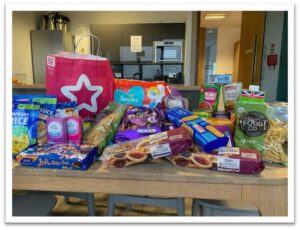Living Our Values

One of our TU values is to be People Focused – to have those who access and deliver health and care at the heart of all we do. We spend a lot of our time at the TU focused on health – often working alongside providers looking at clinical pathways, or busy writing business cases to secure funding for the next large change programme. It can be a challenge to feel connected with what is going on day to day around us, and the experiences of people using health and care services.
Why do we need to connect with the Local Community?
Our health and wellbeing group have recently been in touch with local Voluntary sector organisations to invite them in to talk to our staff to help us to understand the important role of the sector and their contribution to the health and wellbeing of the local population, especially those people that have additional challenges to overcome such as disability, caring responsibilities, low income and deprivation, age and frailty and so on.
The first organisation that we chose to find out more about was Our Sale West. Claire from Our Sale West runs one of 6 local Community Support Hubs funded by several local organisations to carry out important functions. Each hub is hosted by a different local organisation, and they have formed a strong partnership that helps to look after people across Trafford (where our TU office is based).
What do Our Sale West Do?
Clare spent an hour with us describing all the different things that Our Sale West does to support the local community.
- Hosting a weekly food bank to help the most vulnerable people in the area
- Food Share Scheme that helped to distribute food that would otherwise have gone to waste.
- The Bread and Butter Thing which is a food club where you can buy surplus food that would have gone to waste for a fraction of supermarket cost.
- Holiday schemes that helped to feed children that lived in the area
- Digital equipment loans
- Working with a local Mental Health Provider and signposted people to get help there
- Hosting an information hub to help with general advice, benefits, jobs, energy
- Working alongside Sale Credit Union
- there is a volunteer coordinator that had worked with community members to build a wildflower garden
- working with local primary care services that helped to ensure people are connected with primary care services and specifically a nurse that could do health checks – helping to make services more accessible to people
- working with local social prescribers
Health Inequalities in action
Clare also talked about some real experiences and barriers that people faced in accessing health services – things that we do not always naturally think of. We often take it for granted that we can easily get to the right place at the right time for health appointments, but many people, especially those living in poverty, have so many more barriers to overcome to get the healthcare that they need. Our simple trip in the car to attend a health appointment could be a taxi or bus ride for those without a car or unable to drive. And it could mean a day off work and a loss of income. It could become a choice between getting a meal on the table to feed your family or getting to a hospital appointment to address a health issue. It was very thought provoking to hear real life stories about accessibility to services and the barriers we can put in the way without meaning to.
What did we learn from our conversation?
Bringing this back to the TU and our value of being People Focussed, this session really helped those that attended to better understand how the voluntary sector contributes to the health and wellbeing of people in the local area, and to understand health inequalities through listening to real life accounts of the difficulties faced. Conversations like these help us to bring people closer to being at the heart of what we do as an organisation.
These accounts of lived experience and services that exist to support population are relevant to the TU and can help in the work that we carry out because:
- We have a significant number of staff working at a system level, and the voluntary sector are a key component of Integrated Care Systems. Understanding more about what they have achieved and what they do will help us to bring this into our work at system level.
- Health inequalities is a constant talking point at system level. The hubs are situated in areas of higher-than-average deprivation, and therefore this is where we find people with poorer healthy life expectancy. Hearing what the hubs do to support people will help us to better understand the causes of health inequalities locally.
- We have a significant number of staff working on designing target operating models and clinical pathways. Hearing about ‘lived experience’ and considering the ‘place’ within these is important if we are to design pathways that improve people’s experience and are accessible.
Showing our appreciation
And to show our thanks to Clare and Our Sale West, we dropped off some food and toiletry donations to the hub for which Clare and her team were extremely grateful!